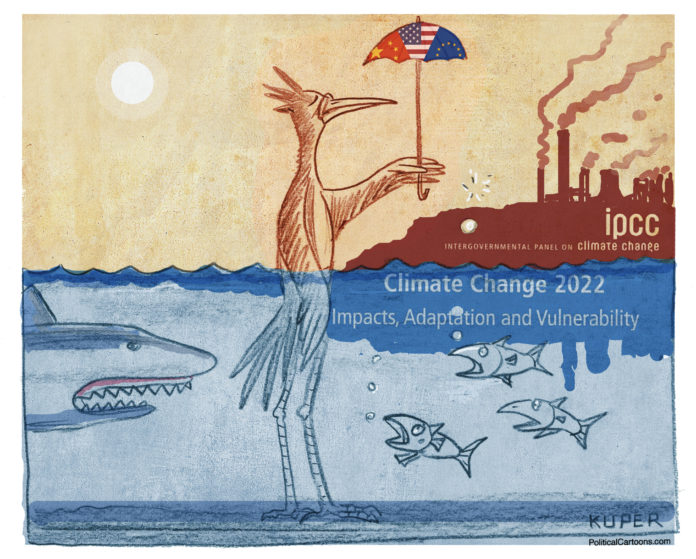Another United Nations climate report can only mean more evidence that ignoring humankind’s impact on increasing global warming precedes dire consequences.
Recently, the Sixth Assessment Report of the Intergovernmental Panel on Climate Change published Climate Change 2022: Impacts, Adaptation and Vulnerability. It opens by acknowledging such “non-climatic global trends” as “biodiversity loss, overall unsustainable consumption of natural resources, land and ecosystem degradation, rapid urbanization, human demographic shifts, social and economic inequalities.”
These negatives are the status quo. That corporate and political leaders push this agenda bespeaks a myopia that would make Mr. Magoo proud. That they keep convincing others to follow them toward climate chaos indicates widespread shortsightedness.
Among the “observed impacts from climate change” cited in the report are: “Human-induced climate change, including more frequent and intense extreme events, has caused widespread adverse impacts and related losses and damages to nature and people, beyond natural climate variability. Some development and adaptation efforts have reduced vulnerability. Across sectors and regions the most vulnerable people and systems are observed to be disproportionately affected.”
One of those more vulnerable areas, the Amazon ecosystem, where a report published in Nature in March found “that more than three-quarters of the Amazon rainforest has been losing resilience since the early 2000s, consistent with the approach to a critical transition … the Amazon rainforest is losing resilience, risking dieback with profound implications for biodiversity, carbon storage and climate change at a global scale.”
That “critical transition” would be from the Amazon rainforest serving as Earth’s lungs to a less verdant savannah. And the report says the “critical threshold” might be nearer than we think.
Also vulnerable are the polar regions. Calving glaciers in Antarctica threaten coastal areas worldwide with rising sea levels. In the Arctic, the thawing of long-frozen permafrost will release “vast amounts of methane,” according to NOVA’s “Arctic Sinkholes.” This additional greenhouse gas – not included in most predictions for global warming – will exacerbate the warming of Planet Eden.
In the short run, a study from the Monterey Bay Aquarium Research Institute indicates that melting permafrost on the sea floor is changing the seascape and landscape. As reported in Science Daily, the report notes “Numerous peer-reviewed studies show that thawing permafrost creates unstable land which negatively impacts important Arctic infrastructure, such as roads, train tracks, buildings, and airports. This infrastructure is expensive to repair, and the impacts and costs are expected to continue increasing.”
While we all now live in sacrifice zones in the eyes of corporate polluters, the problems are worse for some. The UN study notes: “Approximately 3.3 to 3.6 billion people live in contexts that are highly vulnerable to climate change [high confidence]. A high proportion of species is vulnerable to climate change [high confidence]. Human and ecosystem vulnerability are interdependent [high confidence]. Current unsustainable development patterns are increasing exposure of ecosystems and people to climate hazards [high confidence].”
Unfortunately, these regular reminders of the vulnerability of the planet and its inhabitants never report any confidence whatsoever that the necessary adjustments will be made to mitigate the dangers. Even as the evidence mounts.
In mid-February, Huffington Post reported, “Western mega-drought worsens to driest in at least 1,200 years. Our worst-case climate change scenario is playing out live, a new study finds.”
In January, Science Daily cited a NASA report, explaining “Earth’s global average surface temperature in 2021 tied with 2018 as the sixth warmest on record, according to independent analyses done by NASA and NOAA. Collectively, the past eight years are the warmest years since modern recordkeeping began in 1880.”
Science Daily followed that report with one on Feb. 1 that is likely to be repeated across the Northern Hemisphere: “Climate change is causing plants in the UK to flower a month earlier on average, which could have profound consequences for wildlife, agriculture and gardeners.” This condition could eventually threaten our food supply if plants start flowering and wilting before their pollinators emerge.
In January, Matthew Hidalgo of KTVQ-TV in Billings, MT, reported “The Yellowstone River, Billings’ only source of drinking water, hit a historic daily low last month. This has raised concerns about the future of this precious natural resource as a continued source.”
Much of western and southwestern Oklahoma has been experiencing “extreme” drought for months, one grade below the worst rating of “exceptional.”
The warnings are loud and clear. Last year, Tierra Curry, a senior scientist at the Center for Biological Diversity, observed: “”Extinction is not inevitable. It is a political choice.”
Continuing to ignore our scientists leaves only ourselves to blame for Earth’s degradation. But, of course, the condemnation of future generations has no effect on today’s bottom line.
Happy Earth Day!







